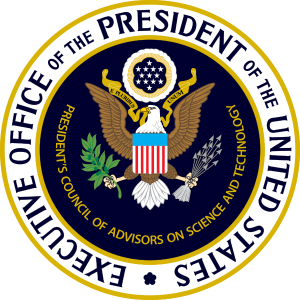 In December 2010 and then again in December 2012, the President’s Council of Advisors on Science and Technology (PCAST) conducted an extensive review of the Federal Networking and Information Technology Research and Development (NITRD) Program – the $4B coordinated multi-agency IT R&D program.
In December 2010 and then again in December 2012, the President’s Council of Advisors on Science and Technology (PCAST) conducted an extensive review of the Federal Networking and Information Technology Research and Development (NITRD) Program – the $4B coordinated multi-agency IT R&D program.
PCAST has just released a 2015 follow-up report on the progress of the NITRD program, which was conducted by co-chairs of the PCAST NITRD Working Group Susan Graham (PCAST Member and UC Berkeley) and Greg Hager (Johns Hopkins University and the Computing Community Consortium Chair). Other PCAST NITRD Working Group Members included, William J. Dally (Stanford University), Eric Horvitz (Microsoft Research), Sara Kiesler (Carnegie-Mellon University), Michael McQuade (United Technologies Corporation), and Eric Schmidt (Google).
Greg Hager presented the group’s findings at the July 14, public PCAST meeting.
In the report, the working group and PCAST members chose to closely examine eight specific areas that are critical to the future of IT: cybersecurity, health, Big Data and data-intensive computing, IT and the physical world, privacy protection, cyber-human systems, high-capability computing, and foundational computing research. The report discusses each of the eight R&D areas in detail and ends with a list of recommendations for the different agencies in the Federal Government.
They are summarized below:
Recommendation 1: Cybersecurity
- The National Science Foundation (NSF) should sponsor broad foundational research on methods to facilitate end-to-end construction of trustworthy systems and on ways to anticipate and defend against attacks.
- Department of Defense (DOD), National Security Agency (NSA), Department of Homeland Security (DHS), and Department of Energy (DOE) should also sponsor both foundational and more applied mission appropriate investigations of these topics.
Recommendation 2: IT and Health
- NSF, Health and Human Services (HHS), NIH, Defense Advanced Research Projects Agency (DARPA), and DOD should continue to support foundational research in health IT.
Recommendation 3: Big Data & Data-Intensive Computing
- NSF, in collaboration with mission agencies that collect large amounts of data for R&D, should continue to sponsor research on methods for performing inference, prediction, and other forms of analysis of data.
- NITRD should work to establish a common set of best practices and support structures for data capture, curation, management, and access.
Recommendation 4: IT and the Physical World
- NSF and DARPA should lead cross-disciplinary programs that will advance research and development of new approaches to robust autonomy, promote integrative approaches to human interaction, and explore new sensing and interface technologies.
Recommendation 5: Privacy
- The Office of Science and Technology Policy (OSTP) and NSTC should continue to develop and expand a multiagency research and development program to advance the science, engineering, policy, and social understanding of privacy protection.
Recommendation 6: Cyber-Human Systems
- NSF should continue to broaden its support for fundamental research on the systems and science of the interplay of people and computing.
Recommendation 7: High-Capability Computing for Discovery, Security, and Commerce
- NSTC should lead an effort to implement a joint initiative for long-term, basic research based on the new National Strategic Computing Initiative.
Recommendation 8: Foundational IT Research
- NSF should continue to invest in long-term foundational research in information technology.
- Other NITRD agencies should support foundational research in those aspects of IT that most affect their missions.
Recommendation 9: Education and Training
- The NITRD Subcommittee should create new educational opportunities in IT at all levels.
- NSF and ED should create programs for training and retraining of workers at all age levels with the goal of providing targeted “on-ramps” for those individuals to develop careers in the IT industry.
Recommendation 10: NITRD Program Component Areas
- OSTP, NCO, and the NITRD Subcommittee, in collaboration with OMB, should revise the PCAs for the FY 2017 Budget cycle and beyond to reflect both the current nature of IT and the major national priorities in which IT plays a major role.
Recommendation 11: NITRD Groups
- The NITRD Subcommittee should establish specific language specifying what the purpose of each type of Group is and what mechanisms should be used to establish, monitor and terminate a Group.
The implementation of these recommendations should play a critical role in ensuring economic competitiveness and improving the overall vitality of the Nation. See the the full report and the OSTP blog for more information.









